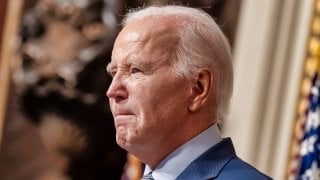Joe Biden Can't Show Weakness on Guyana
Thanks in large part to American weakness, wars are spreading across the world. Europe and the Middle East are on fire, Asia is tense and now, closer to home, another dictator threatens to up-end a great nation just a three-hour flight from Miami, in Guyana.
Joe Biden Needs to Ensure Guyana Isn't Weakened by Venezuela. Thanks in large part to American weakness, wars are spreading across the world.
Europe and the Middle East are on fire, Asia is tense, and now, closer to home, another dictator threatens to up-end a great nation just a three-hour flight from Miami.
Venezuelan dictator Nicolas Maduro has learned valuable lessons from his patron, Vladimir Putin, and has set his sights on neighboring Guyana’s Essequibo region, an area that conveniently possesses massive offshore oil reserves. Maduro’s corrupt regime went so far as to hold a nationwide “referendum” to create the illusion of popular support for its claims, followed by a proclamation that ordered all state-owned companies to “immediately” explore and exploit the oil, gas and mines in the region. The Biden Administration must not risk America’s national security in our own hemisphere to deteriorate by further appeasing Maduro’s regime. Instead, the United States must take every step to re-establish deterrence and keep Maduro from doing to Guyana what Vladimir Putin has done to Ukraine.
Opposing Venezuela’s designs on Guyana is both the right thing to do and in America’s vital national interest. Guyana is a trustworthy partner and a massive source of affordable energy for the American people. Our actions in response to Maduro’s aggression will have a direct impact on energy prices here at home and on the fundamental trajectory of South America for decades. Maduro does not represent the Venezuelan people but rather the interests of America’s adversaries. His dictatorship—like that of his predecessor, Hugo Chavez—has been ten years of pain for the Venezuelan people, delivering hyperinflation, rolling blackouts, and economic collapse, and Maduro has remained in power only by engineering sham elections and leaning on help from foreign nations—namely Cuba, Iran, Russia, and China. President Biden should not underestimate or dismiss the possibility that Maduro will now seek to bolster his own position and legacy by invading Guyana or—more likely—by annexing the territory via subversion, irregular warfare, infiltration, and even the harassment of offshore oil companies.
The Biden Administration playbook puts Guyana and the region at risk. President Biden’s absurd treatment of Maduro to date has been straight out of his ‘appease first, protect America and its friends last’ model that he unleashed on the Middle East. Why on earth would you take sanctions off Maduro and trust his “promise” of free and fair elections? In what Washington-based progressive, defeatist think tank was this deemed remotely likely to happen? Indeed, two weeks after the deal was signed, Maduro banned his primary opposition opponent, Maria Corina Machado, then mocked the Biden Administration’s November 30th deadline by establishing a sham appeal process for detained opposition candidates. Maduro fleeced President Biden and his officials.
What possible rationale could there have been for the Biden Administration allowing Alex Saab—who was being prosecuted here in America for being Maduro and the Ayatollah’s bagman, moving money, gold, and weapons back and forth between two nations that want American destroyed—to be released and allowed to return home to a hero’s welcome? It is almost certain that Saab has already returned to helping these two evil regimes hurt Americans.
Common sense and American security require that we change course. We must reestablish deterrence in the region by first clearly communicating to the Maduro regime, through public and private messaging and shows of force, that the United States will oppose and crush any attempt by Venezuela to instigate conflict with its neighbor. The Administration’s decision to conduct flight operations in collaboration with the Guyana Defense Force is a good start, but more will be required to deter Maduro. We should not act alone, either: Every single one of our partners and allies in the region should be getting a phone call from President Biden, asking them to join together in opposing Maduro’s threat to regional security.
The Biden Administration must also swiftly reimpose the sanctions put in place by the Trump Administration, sanctions that cut Venezuela’s oil exports by 70 percent in just a few short years. The Biden Administration’s decision to lift those sanctions back in October will deliver an expected windfall of $1.4 billion for the dictatorship, all while Maduro’s regime continues to hold American citizens hostage. Sanctions are not solely punitive, but they can – if properly implemented – have a devastating impact on the ability of a regime to project power. We must be both strategic and tactical in using these sanctions to keep Maduro from action.
Finally, America should help build a strong and prosperous Guyana that can defend itself and take care of its own people. This is a nation with great resources—wonderful people who work hard, natural resources that are nearly unrivaled, and a government that is determined to build infrastructure that will improve the lives of all its citizens. My most recent trip there confirmed that the country is well-positioned to realize its promise of incredible prosperity and opportunity, but they will need America’s support to do so.
America recently marked the 200th anniversary of the Monroe Doctrine, in which President James Monroe recognized that Latin America and the Caribbean matter to American security and prosperity and that foreign powers should not meddle or settle there. President Biden should heed Monroe’s wisdom and put Maduro’s benefactors—Xi, Putin, and the Ayatollah—on notice, making clear that America will hold them responsible for any breach of Guyana’s sovereignty.
About the Author: Former U.S. Secretary of State Mike Pompeo
Mike Pompeo, a distinguished fellow at the Hudson Institute, served as the 70th U.S. Secretary of State (2018-21) and Director of the Central Intelligence Agency (2017-18). You can follow home on Twitter: @MikePompeo.
Image Credit: Shutterstock.


